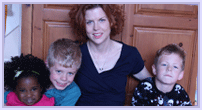Book Review: Childhood’s End by Arthur C. Clarke
 Childhood’s End by Arthur C. Clarke
Childhood’s End by Arthur C. Clarke
Publisher: Audible Studios
Originally Published: 1953
Audible Release Date: October 28, 2008
My rating: 4 of 5 stars
Publisher’s Description:
The Overlords appeared suddenly over every city – intellectually, technologically, and militarily superior to humankind. Benevolent, they made few demands: unify earth, eliminate poverty, and end war. With little rebellion, humankind agreed, and a golden age began.
But at what cost? With the advent of peace, man ceases to strive for creative greatness, and a malaise settles over the human race. To those who resist, it becomes evident that the Overlords have an agenda of their own.
As civilization approaches the crossroads, will the Overlords spell the end for humankind…or the beginning?
BONUS AUDIO: Includes an exclusive introduction by Hugo Award-winning author Robert J. Sawyer, who explains why this novel, written in the 1950s, is still relevant today.
Childhood’s End was first published in 1953 so I assume that present day in the novel is around 1953. The Overlord’s have taken over the earth but not in the way one thinks of aliens taking over the earth. They have brought peace and prosperity to the world. That’s a good thing, right? Maybe not. Clarke hypothesizes that a world without conflict, where humans have everything they need, can, over time, become a world without creativity. After the Overlords have been ruling the Earth for 50 years, approximately the year 2003, Clarke has predicted a world that is eerily like ours in some ways. One of the things that stood out to me was when it was mentioned that humans now had so much leisure time they were watching up to THREE HOURS of television today. As if that was astounding. In real life, it was reported that in 2014 the average American watched FIVE hours of TV every day. And I’m guessing most American’s aren’t too worried about it.
There’s more to the future of humanity that increased television viewing hours. What is the ultimate purpose of the Overlords and why did they choose Earth to inhabit and reform? What does the far off future look like for humans? The answers to these questions are what makes Childhood’s End such a great work of science fiction.
Several characters in the audiobook had accents and the narrator read all of them very well. I enjoyed listening to him.
(I received a complementary copy of this audiobook for review.)




